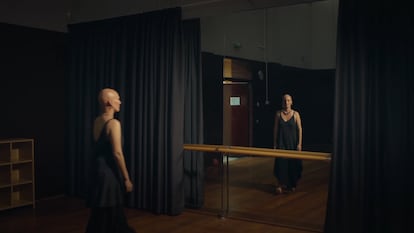How can you say no if he wants you: The limits of consent
After working on the script of the documentary ‘The Yellow Ceiling,’ writer Laura Ferrero reflects on abuses and boundaries in sex

It is nighttime in an anonymous hostel room. A 15-year-old girl lays in bed next to her theater professor, who is twice her age. “He told me to forgive him, that I was so beautiful, to forget it, as if nothing had happened. And he said the phrase that has always resonated in my head: ‘we shouldn’t have let it happen.’” She is Cristina, and she writes this 20 years later. And Cristina, the Cristina in that room, saw the scene — of him groping her — as if it were happening to another person. It is called dissociation. In her memory, she is only capable of staring at the room’s yellow ceiling. If what happened is something that we shouldn’t have let happen, she says to herself, it’s something that I, too, am letting happen. That is, I am responsible, she tells herself.
On May 23, 2020, an investigative article by journalists Núria Juanico and Albert Llimós appeared in the newspaper Ara: “Twenty years of sexual abuse in the Aula de Teatre de Lleida.” In it, several students from the theater center recounted the sexual abuse they suffered by the former director and teacher at the facility, Antonio Gómez. The events happened between 2001 and 2008, when the victims were teenagers, between 15 and 18 years old. In 2018, nine former students of the school filed a complaint against the two teachers. But 10 years had passed, and the crimes could no longer be prosecuted. The abuses, of different types, repeated the same patterns: the sexualization in classes, touching and an abuse of power by the teacher. In June 2019, the Lleida Prosecutor archived the case, and Antonio Gómez disappeared from the map — not without significant compensation.
The film director Isabel Coixet, with whom I have worked for years, read the article by Juanico and Llimós and sent it to me with a note: “I want to make a documentary about this.” The documentary, which would be called El sostre groc (The Yellow Ceiling) in honor of all those ceilings that we have observed with perplexity and frustration, was born at that moment. It culminated on December 16, 2022, when the documentary was released in theaters.
On September 4, 2020, Isabel Coixet received the National Cinematography Award. She thought that the prize would make it easier for her to get financing for the documentary. But a few days later, she received a call from the director of a platform. He had read the dossier for The Yellow Ceiling, but he didn’t find it relevant. On the one hand, the crime’s statute of limitations had expired, and, furthermore, there were no rapes or bloody crimes that could be shown on the screen. Rejections from other platforms added up. They cited the lack of gore and torn and tearful victims. The women of The Yellow Ceiling — Miriam, Goretti, Aida, Sonia, Marta, Violeta and Cristina — looked whole, lucid. There was no drama; there would be no funding.
Despite the refusals, Coixet decided to make the film at her own risk. Thanks also to the work of the lawyer Carla Vall, specialized in gender violence, the documentary was presented at La Paeria, the headquarters of the Lleida City Council, to report to the Prosecutor’s Office a dozen new cases committed between the years 2018 and 2019. No one can say that film is useless.
The film revolves around a complex issue: consent, what it means to say yes and how we say it. Do we say it with certainty, forming an active part of the decision? Or do we give a “yes” under social pressure, as women raised to be depositories of male acceptance and the male gaze? How are you going to tell him no if he wants you, if he looks so nice, if he wrote you a sweet message, if he is your boss, if he is your teacher? As the philosopher Amia Srinivasan recounts in The Right to Sex, “she kept going for the same reason so many girls and women keep going: because women who sexually arouse men are supposed to finish the job.”
Goretti, at one point in The Yellow Ceiling, affirms: “There was no force, but I didn’t feel like I was a part of it.” And Violeta: “I thought we were falling in love.” In reality, we do not always know what we want, and we are not always able to express it clearly. In 2017, a story published in The New Yorker, “Cat Person” by Kristen Roupenian, went viral. It recounted the unremarkable experience of a date that didn’t go quite right. Girl meets boy, they flirt over the phone, and when they finally meet up, she doesn’t like the boy at all, but she goes along with things, convincing herself that he’s not too bad. Once things begin, she feels that she can’t. The story ended in insults. We might ask why she didn’t refuse from the very beginning: didn’t she know what she wanted? But unfortunately, Roupenian’s story sounds familiar to many of us.
The journey of The Yellow Ceiling, of which I have been lucky to be a part, is summed up, in my opinion, in one image: a woman staring at a ceiling, which can be yellow or any other color and texture. “We still don’t know what it is to be free,” says Srinivasan in the final pages of The Right to Sex. And I add, what has happened to us? How many women, at some point, have been there, staring at a ceiling, wondering how we got there? Was this what I wanted? No. Then why can’t I move?
Sign up for our weekly newsletter to get more English-language news coverage from EL PAÍS USA Edition
Tu suscripción se está usando en otro dispositivo
¿Quieres añadir otro usuario a tu suscripción?
Si continúas leyendo en este dispositivo, no se podrá leer en el otro.
FlechaTu suscripción se está usando en otro dispositivo y solo puedes acceder a EL PAÍS desde un dispositivo a la vez.
Si quieres compartir tu cuenta, cambia tu suscripción a la modalidad Premium, así podrás añadir otro usuario. Cada uno accederá con su propia cuenta de email, lo que os permitirá personalizar vuestra experiencia en EL PAÍS.
¿Tienes una suscripción de empresa? Accede aquí para contratar más cuentas.
En el caso de no saber quién está usando tu cuenta, te recomendamos cambiar tu contraseña aquí.
Si decides continuar compartiendo tu cuenta, este mensaje se mostrará en tu dispositivo y en el de la otra persona que está usando tu cuenta de forma indefinida, afectando a tu experiencia de lectura. Puedes consultar aquí los términos y condiciones de la suscripción digital.









































